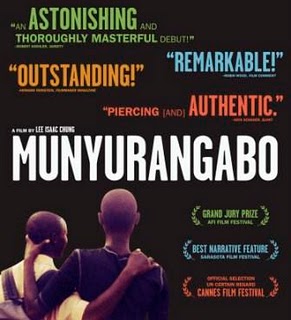
MUNYURANGABO
Rwanda, 2007, 97 minutes, Colour.
Directed by Lee Isaac Chung.
African films in recent Cannes Festivals focused on women and their issues, especially oppressive tribal traditions. This is a film about men’s issues, specifically revenge, forgiveness and reconciliation in the aftermath of the 1994 Rwanda genocide. While several powerful films have come from non-African film-makers, this is from Africa itself.
The origins of the film are particularly interesting. Korean American Lee Isaac Chung and writing partner, Samuel Anderson, conducted a film summer school at a Christian relief base in Rwanda, summer 2006. This film is a project for 15 Rwandan students, a film they can be very proud of.
The plot is straightforward. It is the performance and interpretation that count. The director fostered improvisation so that the characters and their interactions would ring true. Made simply but subtly, in beautiful countryside, the film takes us into Rwanda and the need for peace. This is especially powerful in the long poem about the country, its history and its culture at the end of the film.
1.The impact of the film? Insight into Africa? Rwanda? The genocide and its aftermath?
2.The perspective of the film-maker, an American Korean? His American partners? Teaching summer courses in Rwanda? The Christian relief centre? The students and their making this film as a project? The quality of the film as a project?
3.The small budget, the eleven days of shooting, the village location? The countryside, the house? The traditions and celebrations in the village? The musical score?
4.The language, the use of Kinya Rwanda language? The challenge for the director to direct in this language? The consequences of the film? Going back to Rwanda to establish a company?
5.The improvisation, the performers, their creativity in creating characters, in the dialogue, in the clashes? The re-creation of memories?
6.The background of the genocide, Tutsis and Hutus, the clash? The focus on the two young men in Kigali? Their friendship, support, in the markets? The decision to go back to the village? The Hutu returning home, wanting to see his family after three years? The Tutsi and his vengeance for his dead father, seeking out his father’s killer?
7.The journey on the road, their trekking together, their friendship, the use of the money, hitching? Getting to the village? The Hutu and the welcome from his mother, the delight of the family, his father? Accepting the Tutsi as a guest – but with reservations?
8.The presentation of village life, the family, poverty, work? The background of the genocide and the stances? The prejudices? The celebrations?
9.The focus on the Hutu boy, working, the possibility of his marrying, settling down? Relationship with each member of the family? Clashing with his father, his father being stern, ousting him from the house? Criticising him for his friendship?
10.The Tutsi boy, seeming lazy, in the village, his work, not pulling his weight? The machete, his bringing it with him, looking for vengeance? Suspicions of his friend’s father? His trying to achieve vengeance, his inability to follow through? The effect on him? His leaving the village, going to the house, the confrontation, finding the man dying of AIDS? The repercussions for him?
11.The two young men leaving the village, the Hutu wanting to remain friends, the Tutsi and his not doing this?
12.The aftermath of the vengeance attempt? Would the two friends get together – their going to the city, the markets, the possibility of reconciliation, forgiveness, a future?